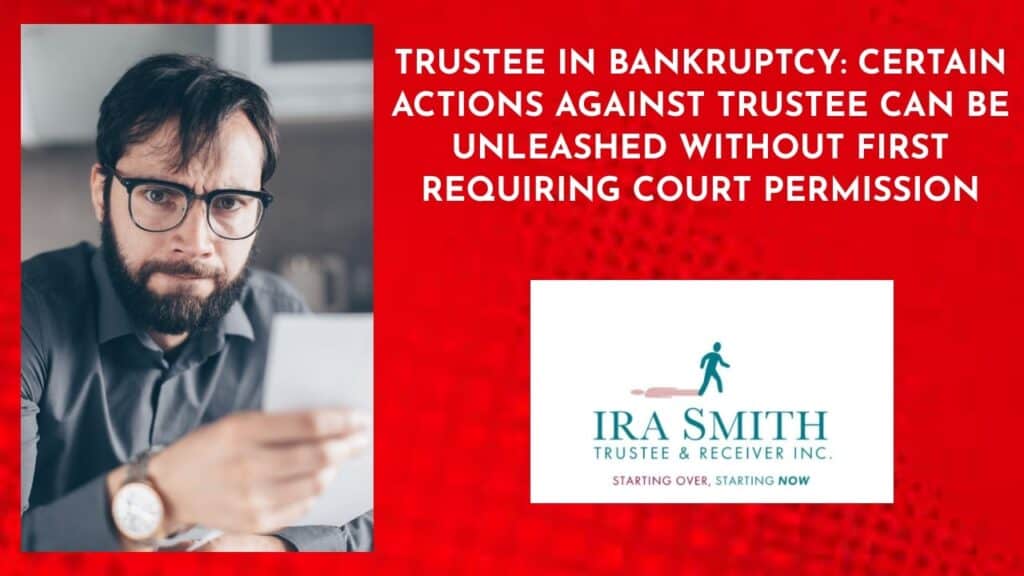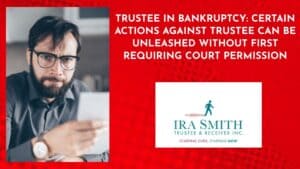
We hope that you and your family are safe, healthy and secure during this COVID-19 pandemic.
Thank you for reading our Brandon's Blog. Check out our AI insolvency bot on this page and don't forget to subscribe!
Ira Smith Trustee & Receiver Inc. is absolutely operational and Ira, in addition to Brandon Smith, is readily available for a telephone consultation or video meeting.
If you would prefer to listen to the audio version of this Brandon Blog, please scroll to the very bottom and click play on the podcast.
- Trustee in Bankruptcy: No action against Trustees without leave of court
- Action against the trustee in bankruptcy background
- The plaintiff's claim against the trustee in bankruptcy
- The court's analysis
- Trustee in bankruptcy: The court's decision
- Finding a good, Licensed Insolvency Trustee (Trustee In Bankruptcy) Near You
Trustee in Bankruptcy: No action against Trustees without leave of court
Canadian insolvency laws say that there cannot be any legal action against trustees in bankruptcy (now called a licensed insolvency trustee) without the prior leave of the court. The leave application, more often than not, would be brought before a Bankruptcy Judge. However, as you will see below, any Judge of the Ontario Superior Court of Justice could hear such an application involving a trustee in bankruptcy.
Section 215 of the Bankruptcy and Insolvency Act (Canada) (BIA) protects the Canadian bankruptcy laws for all officials in the bankruptcy process, including the bankruptcy trustee:
“215 Except by leave of the court, no action lies against the Superintendent, an official receiver, an interim receiver or a trustee with respect to any report made under, or any action taken pursuant to, this Act.”
In my January 9, 2019, Brandon Blog, PRIVACY BREACH LAWSUIT AGAINST LICENSED INSOLVENCY TRUSTEE FAILS, I described one attempt that failed to obtain leave of the court to begin litigation against a trustee in bankruptcy.
Our bankruptcy and insolvency courts believe that the test to determine whether a court should use its discretion to give leave for litigation to be commenced against either a trustee in bankruptcy or a court-appointed receiver was not a tough test. The protection is only to ensure that the receiver or trustee in bankruptcy is protected against senseless or burdensome actions that have no basis.
In this Brandon Blog, I describe a recent Ontario court decision that further clarifies a basis for when the court will exercise its discretion and allow litigation against a licensed trustee in bankruptcy. As the Motions Judge used the old terminology, I will stick with it in this blog.
Action against the trustee in bankruptcy background
The Motion Judge‘s Endorsement was released on May 31, 2021. The Endorsement was from a motion by the plaintiff for a determination as to whether or not leave of the court under S.215 of the BIA was required. The plaintiff’s position was that it was not, but if it was, such leave should be granted. The defendant trustee in bankruptcy’s position was that leave was required and should not be granted.
The plaintiff, Mr. Flight, ended up filing bankruptcy proceedings 4 times over a 13 year period of time! He filed the same type of bankruptcy over and over again! He claims his financial situation is the fault of the defendant trustee in bankruptcy. He used the same trustee in bankruptcy for all of his bankruptcies! It is not clear in this motion how the trustee is responsible for his having to file personal bankruptcy all those times.
Mr. Flight brings on litigation against the trustee in bankruptcy claiming negligence, fraud, breach of fiduciary duty, unjust enrichment and conversion. The complainant claims the accused failed to identify and take suitable action relating to a fraud perpetrated by the bookkeeper for Mr. Flight’s sole proprietorship business.
The plaintiff’s amended claim seeks a declaration the defendant engaged in misfeasance, negligence, fraud and breach of fiduciary duty in his personal capacity, and that the defendant was unjustly enriched.

The plaintiff’s claim against the trustee in bankruptcy
The main subject matter of the claim alleges the bookkeeper’s theft caused the plaintiff’s repeated bankruptcies and that the defendant trustee in bankruptcy ought to have detected this fraud in the administration of the four bankruptcies.
The plaintiff maintains that the trustee in bankruptcy then failed to take any meaningful action to address the alleged fraud and its impact on the fourth bankruptcy after its discovery. In particular, the plaintiff claims the trustee failed to diligently commence an action against the former bookkeeper, failed to investigate the fraud, failed to adjust the plaintiff’s surplus income, failed to recommend debt relief options or financial options, and certainly no other possible insolvency process such as a consumer proposal alternative to bankruptcy and failed to have the plaintiff promptly discharged from his fourth bankruptcy.
The defendant’s alleged “grand failure to act” caused Mr. Flight damages of $10 million from loss of business, loss of profit, loss of income and pain and suffering.
The court’s analysis
As I mentioned above, the threshold issue under Canadian insolvency legislation is whether the plaintiff required leave to commence this action. If it is determined that leave is required, the analysis then moves to whether the claim meets the test for leave.
The Motion Judge stated that there is authority to support the plaintiff’s position that the insolvency laws state that leave is not required where the trustee in bankruptcy is being sued in its personal capacity.
More particularly, the Supreme Court of Canada held that the leave provision under the BIA is not to be interpreted as though it applied to any action arising out of the administration of the estate. That is not the way section 215 is worded. To allege that the trustee in bankruptcy made an act of omission is a claim that is not concerning a report made under or any action taken according to the BIA.

Trustee in bankruptcy: The court’s decision
The plaintiff alleges causes of action against the trustee in bankruptcy in his personal capacity in their amended statement of claim and affidavit materials for negligence, fraud, breach of fiduciary duty, unjust enrichment and conversion starting with the confidential consultation and with each bankruptcy assignment. The Motion Judge concluded that the plaintiff does not require leave under s. 215 of the BIA to commence this action. Based on this conclusion, the Motion Judge did not need to consider anything further.
You will observe as I previously stated, none of the court’s evaluation had anything to do with whether the claims had a possibility of success in its litigation legal process. The Motion Judge, who was not a Bankruptcy Judge but rather a Motion Judge felt the accusations were such that they were not purposeless or burdensome actions that have no basis.
As the main action will now proceed, I will follow the case to find out the exact details and the various bankruptcy claims that Mr. Flight is making regarding the conduct of trustees involved. As the case is reported, I will report to you.
Finding a good, Licensed Insolvency Trustee (Trustee In Bankruptcy) Near You
I hope that you found this trustee in bankruptcy Brandon Blog interesting. If you are concerned because you or your business are dealing with substantial debt challenges and you assume bankruptcy is your only option, call me.
It is not your fault that you remain in this way. You have actually been only shown the old ways to try to deal with financial issues. These old ways do not work anymore.
The Ira Smith Team utilizes new modern-day ways to get you out of your debt difficulties with debt relief options as alternatives to bankruptcy. We can get you the relief you need and so deserve. Our professional advice will create for you a personalized debt-free plan for you or your company during our no-cost initial consultation.
The tension put upon you is big. We know your discomfort factors. We will check out your entire situation and design a new approach that is as unique as you and your problems; financial and emotional. We will take the weight off of your shoulders and blow away the dark cloud hanging over you. We will design a debt settlement strategy for you. We know that we can help you now.
We understand that people and businesses facing financial issues need a realistic lifeline. There is no “one solution fits all” method with the Ira Smith Team. Not everyone has to file bankruptcy in Canada. The majority of our clients never do as we know the alternatives to bankruptcy. We help many people and companies stay clear of filing an assignment in bankruptcy.
That is why we can establish a new restructuring procedure for paying down debt that will be built just for you. It will be as one-of-a-kind as the economic issues and discomfort you are encountering. If any one of these seems familiar to you and you are serious about getting the solution you need to become debt-free, contact the Ira Smith Trustee & Receiver Inc. group today.
Call us now for a no-cost bankruptcy consultation.
We hope that you and your family are safe, healthy and secure during this COVID-19 pandemic.
Ira Smith Trustee & Receiver Inc. is absolutely operational and Ira, in addition to Brandon Smith, is readily available for a telephone consultation or video meeting.
